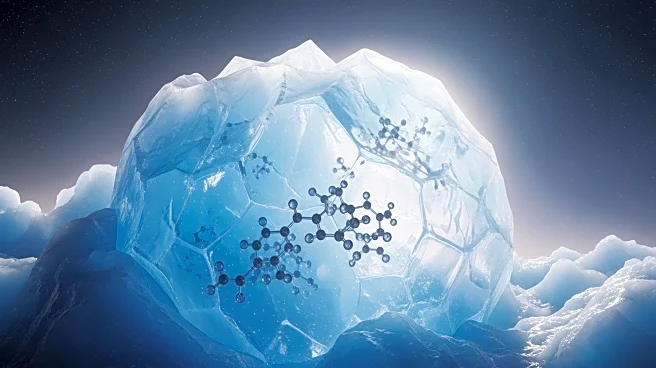What's Happening?
A recent study has identified new organic molecules spewing from Saturn's icy moon Enceladus, indicating a potential for habitability. The discovery was made by analyzing data from the Cassini spacecraft,
which flew through the plumes of ice erupting from Enceladus before its mission ended in 2017. These plumes originate from an ocean beneath the moon's surface. The study, led by planetary scientist Nozair Khawaja, found organic compounds not previously detected, suggesting complex chemistry within Enceladus's ocean. This finding has spurred interest in the European Space Agency's L4 mission, set to launch between 2040 and 2042, aiming to explore Enceladus further.
Why It's Important?
The discovery of organic molecules on Enceladus is significant as it enhances the moon's potential for habitability. Organic compounds are essential building blocks for life, and their presence suggests that Enceladus's ocean may harbor conditions similar to those near Earth's hydrothermal vents, where life thrives. This finding could reshape our understanding of where life might exist beyond Earth, influencing future space exploration missions. The L4 mission, along with ongoing missions to Jupiter's moon Europa, could provide further insights into the habitability of icy moons, potentially expanding the search for extraterrestrial life.
What's Next?
The European Space Agency's L4 mission is expected to launch between 2040 and 2042, with the goal of reaching the Saturn system by 2050. This mission will focus on landing on and orbiting Enceladus, sampling its plumes, and exploring other Saturnian moons. The mission will utilize advanced technology, including updated mass spectrometers, to analyze the moon's composition more thoroughly. The results could provide critical data on the potential for life on Enceladus, influencing future exploration strategies and scientific understanding of life in the universe.
Beyond the Headlines
The discovery of organic molecules on Enceladus raises ethical and philosophical questions about the search for life beyond Earth. It challenges scientists to consider the implications of finding life elsewhere and the responsibilities that come with such discoveries. Additionally, the technological advancements required for missions like L4 could drive innovation in space exploration, benefiting other scientific fields. The study also highlights the importance of international collaboration in space research, as missions to explore distant moons require significant resources and expertise.









